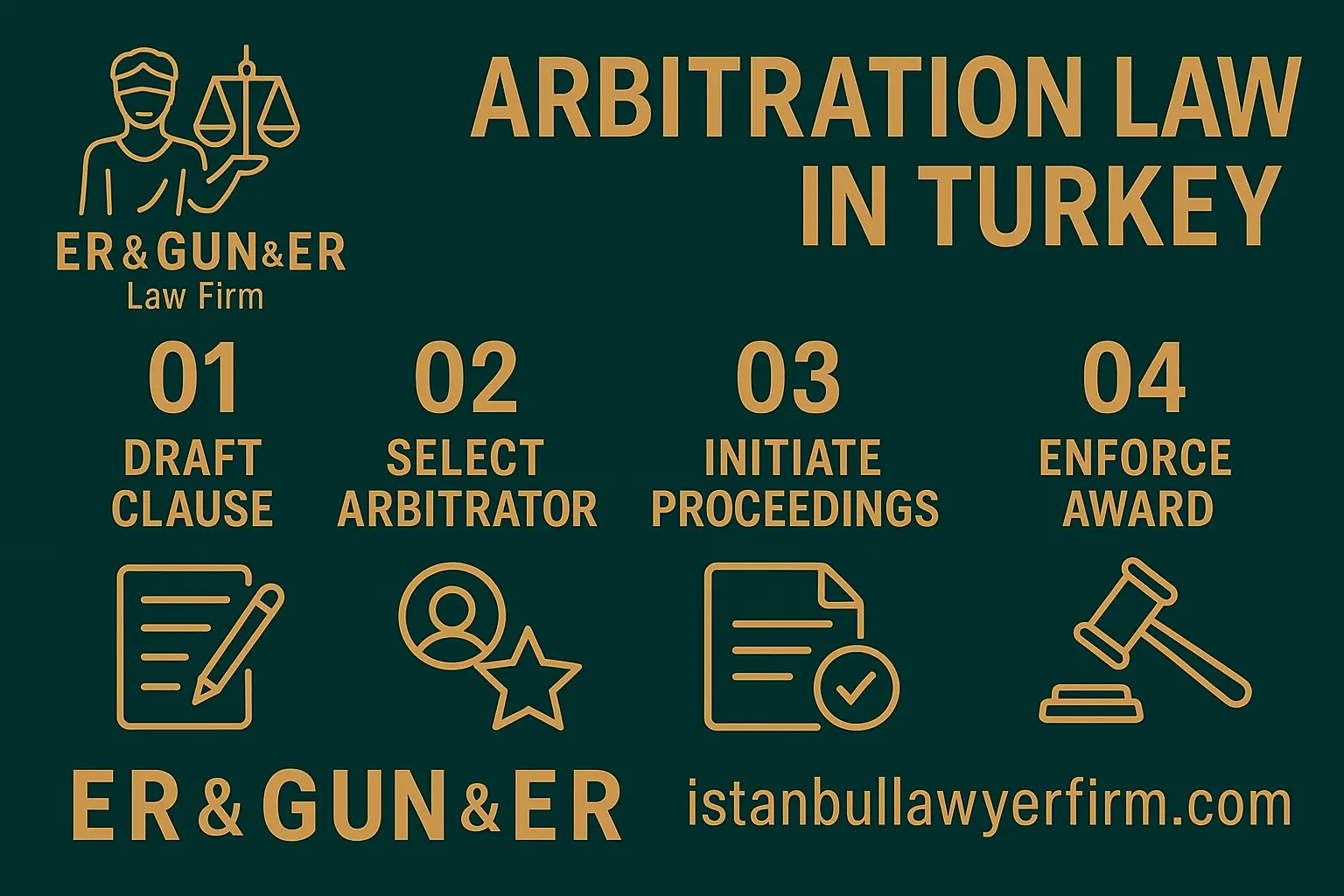
Arbitration in Turkey is a preferred method for resolving commercial, construction, and cross-border disputes outside of court, providing speed, confidentiality, and enforceability. Turkish arbitration law is governed by the Turkish International Arbitration Law No. 4686 for foreign elements, and by the Code of Civil Procedure (HMK) for domestic arbitration. Turkey is also a party to the New York Convention on the Recognition and Enforcement of Foreign Arbitral Awards. At Istanbul Law Firm, our English speaking lawyers in Turkey provide end-to-end representation in ICC, ISTAC, and ad hoc arbitration proceedings.
Whether you are drafting arbitration clauses, initiating proceedings, or enforcing an award, we deliver experienced legal strategy and procedural precision. Recognized as a best lawyer firm in Turkey for arbitration, we handle complex disputes with international scope and local enforcement strength. Related: How to Draft a Valid Arbitration Clause in Turkey, How to Enforce a Foreign Arbitral Award in Turkish Courts
Types of Arbitration in Turkey: Domestic and International
Arbitration in Turkey is divided into two categories: domestic arbitration, governed by the Turkish Code of Civil Procedure (HMK), and international arbitration, regulated under Law No. 4686. The classification depends on whether the dispute involves a foreign element—such as parties from different countries, foreign capital, or an international seat. Domestic arbitration typically involves Turkish parties and institutions like the Istanbul Arbitration Centre (ISTAC), while international arbitration may be seated in Turkey but governed by ICC, UNCITRAL, or LCIA rules. At Istanbul Law Firm, we represent clients in both contexts, adapting strategy to applicable law and procedural framework.
Our English speaking lawyers in Turkey draft arbitration clauses that clarify applicable law, language, number of arbitrators, and institutional rules. We also advise clients on jurisdictional objections, interim relief measures, and procedural differences between institutional and ad hoc arbitration in Turkey. Whether seated in Istanbul or abroad, we manage filings, challenge arbitrator appointments where necessary, and ensure fair conduct throughout the arbitral process.
As a best lawyer firm in Turkey for commercial arbitration, Istanbul Law Firm ensures your dispute is handled efficiently, enforceably, and with full procedural rights. Related: When to Choose Arbitration Over Court Proceedings, ISTAC vs. ICC Arbitration in Turkey: What to Know
Arbitration Clauses, Jurisdiction, and Procedural Strategy
The enforceability of arbitration depends on having a valid, well-drafted arbitration agreement. Turkish courts will dismiss a lawsuit if a binding arbitration clause exists in the underlying contract, provided the clause identifies the forum, scope, and method of appointing arbitrators. Poorly drafted clauses can lead to jurisdictional challenges, delay, or unenforceability. At Istanbul Law Firm, we draft and review arbitration clauses for contracts across sectors—construction, energy, distribution, M&A, and IP licensing—ensuring full legal enforceability under Turkish and international law.
Our English speaking lawyers in Turkey handle jurisdictional objections (itiraz) before Turkish courts, represent parties in arbitration referrals, and initiate emergency arbitration for urgent interim measures. We advise on choosing institutional rules, setting the seat of arbitration, and planning procedural timelines to minimize cost and delay. We also prepare bilingual arbitration protocols that align with Turkish Civil Procedure and the expectations of international tribunals.
As a best lawyer firm in Turkey for arbitration counsel, Istanbul Law Firm ensures each clause is enforceable and each step legally sound. Related: What Happens When Arbitration Clauses Are Disputed?, Checklist for Enforceable Arbitration Clauses in Turkey
Representation in ISTAC, ICC, and Ad Hoc Arbitrations
Turkey-based and international parties frequently choose arbitration institutions such as the Istanbul Arbitration Centre (ISTAC), International Chamber of Commerce (ICC), and London Court of International Arbitration (LCIA) to resolve their commercial disputes. Each institution has its own rules, timelines, and cost structures. At Istanbul Law Firm, we represent clients before ISTAC panels, ICC tribunals, and ad hoc arbitrations operating under UNCITRAL or party-agreed procedures, managing every stage from notice of arbitration to final award and cost recovery.
Our English speaking lawyers in Turkey prepare statements of claim and defense, handle arbitrator challenges, examine witnesses, and present documentary and expert evidence with fluency in both legal and procedural language. We work with technical experts, translators, and international counsel to manage multi-jurisdictional claims involving construction delays, shareholder disputes, licensing breaches, and cross-border sales of goods or services.
As a best lawyer firm in Turkey for arbitral litigation, Istanbul Law Firm ensures your arbitration case is handled with procedural precision, cultural understanding, and strong advocacy. Related: How ISTAC Arbitration Works in Turkey, ICC Arbitration: What to Expect in a Turkey-Seated Case
Recognition, Enforcement, and Challenge of Arbitral Awards
One of arbitration’s key advantages is the international enforceability of awards. Turkey is a party to the 1958 New York Convention, allowing foreign arbitral awards to be recognized and enforced in Turkish courts unless they violate public policy or due process. At Istanbul Law Firm, we assist clients in enforcing ICC, LCIA, and other arbitral awards in Turkey by filing exequatur petitions in competent commercial courts and ensuring compliance with Turkish procedural rules.
We also represent clients in challenging domestic awards under Article 439 of the Code of Civil Procedure for grounds such as excess of authority, procedural irregularity, or public order violation. Our English speaking lawyers in Turkey prepare enforcement filings, respond to objections, and initiate asset seizure or execution once a foreign award is granted exequatur. We also coordinate with foreign firms on reciprocal enforcement of Turkish-seated awards abroad.
Recognized as a best lawyer firm in Turkey for arbitration enforcement, Istanbul Law Firm turns favorable awards into tangible recoveries while minimizing delay and resistance. Related: How to Enforce Foreign Arbitration Awards in Turkey, Legal Grounds for Challenging Arbitral Awards in Turkey
Why Istanbul Law Firm Is the Strategic Arbitration Counsel of Choice in Turkey
At Istanbul Law Firm, we combine deep knowledge of Turkish arbitration procedure with cross-border litigation experience to deliver strategic outcomes in domestic and international disputes. From clause drafting and pre-dispute planning to full arbitral representation and award enforcement, we provide end-to-end support that’s responsive, bilingual, and business-focused.
Our English speaking lawyers in Turkey act for global corporations, regional investors, construction firms, and technology companies in high-stakes arbitrations across commercial sectors. We understand institutional rules, sector practices, and enforcement dynamics—ensuring that your arbitration strategy is proactive, defensible, and globally enforceable.
As a best lawyer firm in Turkey for arbitration law, Istanbul Law Firm is your trusted legal partner in complex, multi-jurisdictional dispute resolution. Related: How to Build an Effective Arbitration Strategy in Turkey, Is Arbitration the Right Path for Your Turkish Dispute?
Frequently Asked Questions (FAQ)
- Is arbitration recognized under Turkish law? – Yes. Both domestic and international arbitration are legally enforceable in Turkey under Civil Procedure and International Arbitration Laws.
- Can foreign companies arbitrate disputes in Turkey? – Absolutely. We represent international clients in ICC, ISTAC, and ad hoc arbitrations seated in Turkey or abroad.
- What makes a valid arbitration clause in Turkey? – It must be in writing, clearly state intent to arbitrate, define scope, and name the institution or rules. We draft enforceable clauses.
- Can Turkish courts intervene in arbitration? – Only in limited cases, such as appointing arbitrators, granting interim relief, or enforcing awards. We manage all court interactions.
- How long does arbitration take in Turkey? – ISTAC fast-track arbitration may conclude in 3–6 months; full procedures can take 8–18 months depending on complexity.
- Are arbitration awards enforceable in Turkey? – Yes. Turkish and New York Convention awards can be enforced unless public order or procedural defects apply.
- Can I appeal an arbitration award? – Not on the merits. But awards may be challenged for procedural violations or arbitrator bias. We handle set-aside proceedings.
- Is arbitration confidential in Turkey? – Yes. Confidentiality is a core feature. We help clients protect sensitive data and business secrets during the process.
- What’s the difference between ISTAC and ICC arbitration? – ISTAC is local, cost-effective, and Turkish law-aligned; ICC is global and widely recognized. We advise on both paths.
- Who selects the arbitrators? – Parties may agree or follow institutional rules. We assist in choosing impartial, qualified arbitrators based on industry and dispute type.
- How much does arbitration cost in Turkey? – Depends on claim value, tribunal size, and institution. We provide budget forecasts and manage costs strategically.
- Who is the leading arbitration law firm in Turkey? – Istanbul Law Firm—a best lawyer firm in Turkey—with a strong track record in ICC, ISTAC, and enforcement proceedings.
Contact Our Turkish Arbitration Lawyers Today
Whether you’re drafting an arbitration clause, initiating a cross-border dispute, or enforcing an award in Turkey, Istanbul Law Firm provides strategic, experienced, and results-focused arbitration counsel. Our English speaking lawyers in Turkey are trusted by international businesses and local clients alike to deliver clarity and advocacy in complex arbitration matters. As a best lawyer firm in Turkey for arbitration law, we represent your interests with precision, professionalism, and global enforceability. Contact us today for tailored dispute resolution advice.


